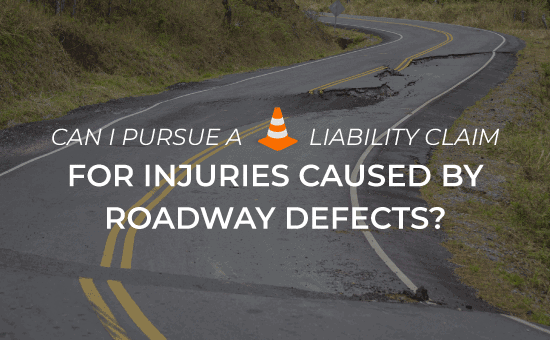Can I Pursue a Liability Claim for Injuries Caused by Roadway Defects?

Michigan is known for its beautiful summers, crisp autumns, and brutally cold winters. Unfortunately, the seasons that make Michigan so unique can also cause problems for motorists. Michigan roads are subject to extreme wear and tear due to the rapidly changing weather of the state. Because of this, potholes and other roadway defects are some of the most common reasons for accidents on Michigan roads. When you’re injured as the result of a highway or roadway defect, pursuing a liability claim oftentimes requires taking legal action against the governmental entity responsible for fixing or maintaining that road. Unfortunately, the governmental agencies in charge of maintaining these roadways often cannot be held responsible for failing to properly maintain and repair public roadways. This is true in all but a few limited circumstances. This article will provide you with an oversight of what those circumstances are, and what must be done very soon after an accident.
Sovereign Immunity – Can You Sue the Government For a Roadway Defect?
When a roadway defect is the cause of a motor vehicle accident, your first question might be “who is responsible for this?” In most cases, state or local government agencies oversee the maintenance of the roadway. However, suing the government for unsafe roads can be difficult due to a law that prevents citizens from suing government entities for acting within official functions.
In most cases, government agencies are exempt from being named as parties in a lawsuit under the legal doctrine of sovereign immunity. Sovereign immunity essentially means that the government and its agencies cannot be sued without its consent. However, there are some exceptions to sovereign immunity that will allow a person to sue a government agency. For example, one exception to sovereign immunity is the Maintenance of Public Highways exception. This exception applies to every “highway, road, or street that is open for public travel,” and applies to every governmental unit – whether state or local – which is responsible for a publicly-traveled road. This exception requires that the government maintain the roadway “in reasonable repair so that it is reasonably safe and convenient for public travel.” If the government agency does not perform this duty, anyone who suffers an injury to their person or property can recover for the government’s negligence. However, it will be up to the individual to show that the defect was, in fact, part of the roadway and that the government agency had notice of the pothole or defect and failed to address it within a reasonable period of time.
What Is A Roadway Defect?
When thinking of a roadway, one would normally envision the roadway itself where cars travel, crosswalks pedestrians are directed to use, as well as the shoulder and parallel parking spaces that often run alongside the Michigan roadway. However, for purposes of bringing highway defect claims, the roadway only includes the part of the road that a car actually travels on. Additionally, you cannot bring a roadway defect claim for defects associated with the design of the roadway. As a result, highway defect claims are limited to potholes, uneven surfaces, and other defects within the road itself. Defects caused within the shoulder and fog lines, defects in traffic signals, and poor design of roadways cannot be used to bring a roadway defect claim.
Accordingly, a roadway defect is just that, a roadway defect. The duty of government agencies to keep the road in reasonable shape only extends to the “improved portion of the highway designed for vehicular travel.” In other words, this duty only applies between the white fog lines on either side of the road. This duty does not include areas like the curb, shoulder, or ditches, and the government will not be held responsible for injuries sustained by these areas of a roadway. So while you may have a claim against the government for an injury caused by a pothole in the center of the road, you will not have a claim for an injury caused by a similar pothole on the shoulder of the roadway.
Notice of Injury and Defects
If you experience one or more of the roadway defects above and believe you have a claim against the government for failing to maintain the roadway in a reasonably safe way, you must next be aware of notice requirements. Before an injured person can sue the government under the Maintenance of Public Highways exception, he or she must send written notice to the government agency responsible for that portion of the roadway. Notice of the injury must include the following:
- The name of the person injured
- The injuries sustained by the roadway defect
- The exact location of the roadway defect
- The nature of the roadway defect
- The names of any witnesses known at the time of notice
Suing the Government for Unsafe Roads Requires Prompt Action
Further, you must follow a very specific timeframe in order to bring a successful claim against a government agency for failing to address a roadway defect. Notice requirements vary between jurisdictions but generally give a claimant less than 60 days to notify the government agency of the defect. If you miss the deadline, you cannot collect any damages for the injury. While this consequence is harsh, it is Michigan law, and it is extremely important to be diligent. If you believe you have a claim based on a poorly-maintained roadway, you should not hesitate to contact an experienced Michigan personal injury lawyer. Failing to act promptly could limit or even completely prevent you from meeting the notice requirements, causing you to lose your case altogether.

